How to File an SR-22 in Texas: Essential Tips for DUI Offenders
Applying for an SR-22 in Texas can be intimidating for those who have been convicted of a DUI. Between understanding the regulations, gathering the necessary documentation, and finding an insurance provider that will supply the form, the task can seem daunting. But with the right tips, filing for an SR-22 form can be an achievable endeavor. Let’s take a look at the essential information to help make the process smoother.
The first step for DUI offenders in Texas is to purchase your SR-22 insurance policy. This can be done from any Texas-licensed auto insurance provider. Keep in mind that while the insurance provider will file the form for you, it is your responsibility to make sure that the coverage will remain continuous. Any lapse in payment may result in the cancellation of the SR-22, which may result in suspension of your license. To prepare, be sure to keep up to date on all payment and policy timeline deadlines.
In order to keep track of your coverage, ask your insurance provider to send you an email or written correspondence that states the start and end date of your policy. This will allow you to remain proactive and ensure that coverage is up to date. And don’t forget to confirm that the insurance provider has indeed filed the SR-22 with the Texas Department of Motor Vehicles, as this is a critical step in the process.
It’s also important to remember that you’ll have to pay an extra fee for the privilege of owning an SR-22 policy. This fee can range from $20 to $50, depending on the insurance provider, so be sure to get a quote for the coverage in advance. You’ll also have to pay the applicable annual premium in addition to the fee for the filing, so take that into account when you make your payment.
Once you have purchased the SR-22 insurance policy, keep in mind that you’ll need to maintain a continuous coverage for a minimum of 36 months. This means that you cannot switch insurance coverage or cancel the policy before your 36-month period is up. Any discrepancies may result in your policy being canceled and potentially your license being suspended.
The fourth step of the process requires you to have an understanding of when you must file a new SR-22. In the event that you have been driving a non-insured vehicle or have been convicted of another DUI, you will need to file a new SR-22 form. If this is the case, you’ll need to begin the process of acquiring an SR-22 policy again and go through the same steps as before.
The fifth and one of the most important obligations is to pay your premium on time. Missing payment deadlines can lead to the cancellation of your policy and will initiate the 30-day grace period. If payment is not received within the grace period, the Texas Department of Motor Vehicles will be notified and your license may be suspended.
Lastly, if you are no longer eligible for an SR-22 coverage, you will need to terminate the policy. This is a critical factor to consider as it is your responsibility to inform your insurance provider of the policy cancelation. To ensure that the insurance provider has the necessary information to file the form, you must fill out a written request for the cancelation to the insurance provider and the Texas Department of Motor Vehicles.
With these tips, filing an SR-22 in Texas should be relatively straightforward. Keep in mind that each state has different requirements and be sure to double check with a local DMV office to make sure that all requirements are being met. Being proactive and keeping a record of all documentation can save time and help prevent any potential complications down the road.
When it comes to complying with regulations, its important to gather the proper documents and fill out the necessary paperwork before making any moves. Gather proof of any relevant driving records, your driver’s license information, and records of any traffic-related convictions. That way, you can be sure you have all the information the DMV and insurance providers need for filing your SR-22 documents.
Sometimes waiting periods after a DUI conviction can feel like an eternity. But dont rush the process when it comes to filing your SR-22. Making sure all your documentation is in order and that your policy is up to date will help facilitate the process and keep your license valid.
For those who want to stay ahead of the game, make sure to review your insurance policies regularly and pay your premiums on time. That way, you can move forward with your life and keep your SR-22 in good standing. Seeking the advice of a professional attorney with SR-22 experience can also ensure that the process goes as smoothly as possible.
Its also important to remember that the SR-22 form is not a one-time filing. In fact, owners of an SR-22 policy must maintain continuous insurance coverage for at least 36 months. That means that if the policy is not kept up to date, your license can be suspended. To avoid any bumps in the road, be sure to keep track of payment deadlines and schedule regular renewal dates so that your coverage remains active.
Understandably, it can be difficult to predict changes in circumstances that could mean extra effort in renewing an SR-22 policy. Working with a reliable insurance provider that supports you when changes occur can be invaluable. They can provide important value-added services such as advising on the best course of action and helping to secure any pending paperwork.
When it comes to the importance of owning an SR-22 in Texas, the consequences of not having one far outweigh the benefits. Suspension of a drivers license, financial penalties, and loss of car rentals are all common risks associated with noncompliance for Texas citizens. Taking the time to understand the process will not only protect your license, but it will give you peace of mind that you have done everything in your power to comply with the legal requirements.
Though it can be hard to manage the responsibility of filing an SR-22 for a DUI conviction, the alternative is a lot worse. With the right knowledge and preparation, you can make sure your policy is compliant and give yourself the best chance of maintaining your valid license. When it comes to staying safe on the roads and avoiding hefty fines and license suspension, taking the necessary steps to file an SR-22 is an essential part of the process.
In addition to understanding and following the laws, staying safe on the roads by being a defensive driver and avoiding distractions is of the utmost importance. Taking a few extra seconds to think each time you get behind the wheel or drive through a high-traffic area could make all the difference in avoiding a dangerous situation.
Furthermore, as a driver, always remember to never get behind the wheel when under the influence of any substance that affects your physical or mental state. Penalty fees for driving under the influence can be extremely costly and will likely result in having to file for an SR-22.
Although it may seem hard to believe, the best defense against getting out on the roads when you are not mentally or physically capable is simply to avoid getting into a vehicle at all. Making use of resources like public transportation or ride-sharing services in their designated areas is one of the safest bets.
When it comes to total risk mitigation, there are numerous methods to avoid driving while under the influence. From joining a carpool or using a rideshare or taxi, to monitoring your blood alcohol content levels, to receiving a breathalyzer installed in your vehicle, being proactive is always better than being reactive.
In conclusion, filing an SR-22 in Texas is a critical step that DUI offenders must take in order to maintain their valid license. With the right knowledge and preparation, DUI offenders can be proactive and compliant for the full 36-month period of the policy. Understanding the regulations, gathering the necessary documentation, and finding an insurance provider that will supply the form can be daunting; but following the essential tips provided can make the process smoother. Being well-informed and prepared will protect your valid license and avoid hefty fines and suspension penalties.



